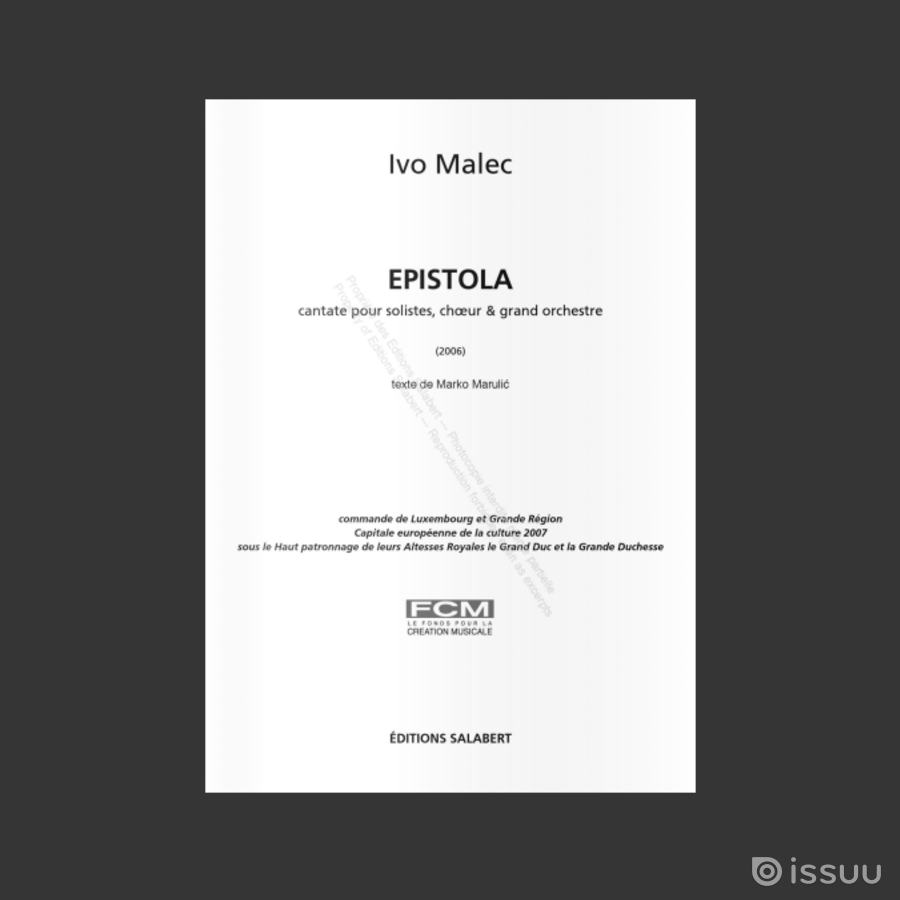A pioneer of “mixed” music and a key figure of French musical creation, the Croatian-born composer Ivo Malec passed away on 14 August 2019 at the age of ninety four.
He left us in the middle of August, as if he hoped to catch us off guard. But he only deepened our sadness. High-spirited as ever, even despite his age! To share a conversation with him was a delight, and it will be missed. We are left with his music, which also speaks of so many unforgettable and essential things. We are also left with the memory of his career, one unlike any other in Europe in the second half of the 20thcentury.
The young Croatian who moved to Paris in 1959, thanks to the hospitality of Henri Dutilleux, was not as young as his slim and elegant silhouette suggests. At the age of 34, he was already an experienced composer, having already composed a piano sonata, various chamber works, a symphony, and works for the stage and ballet. Following the departure of Xenakis, Ivo Malec was the eldest of the musicians working under Pierre Schaeffer at the Groupe de Recheche Musicale. Though he decided to leave his native country definitively, this was not only to escape the stifling atmosphere of Tito's Yugoslavia; he remained linked to Zagreb, his hometown, thanks in particular to the International Biennale of Contemporary Music, of which he was one of the first organisers. In fact, it was his encounter with musique concrète during his previous stays in Paris that pushed him to finally take the plunge: he would often repeat that this encounter was the turning point of his life.
The creation and manipulation of objets musicaux (“musical objects”), as Pierre Schaeffer named them, did not put Ivo Malec on a new path of composition so much as on a new path of thinking about music, starting with a closer listening and a greater understanding. This new experience was particularly rewarding in the hands of a “traditionally” trained classical musician. The composer’s second realisation was no less fundamental: drawing upon the methods of organisation of the musique concrète sounds developed at the Groupe de Recherche Musicale, Ivo Malec discovered that these could also be perfectly applied to instrumental composition. Thus arrived Sigma in 1963, a dazzling composition only ten minutes in length that was performed throughout Europe, a magnificent work for orchestra that would punctuate his entire career until Sonoris causa in 1997, not to mention three concertos, for double bass (Ottava bassa, 1984), violin (Ottava alta, 1995) and cello (Arc-en-cello, 2003).
Ivo Malec was particularly drawn to stringed instrument, and devoted to them several opuses under the title Arco with a number (1, 11, 22) announcing the relevant musical forces. It was with Lumina, a work for 12 strings and band, that the composer established in 1968 what is considered his third founding experience, that of mixed music. He was now able to create a work capable of combining instrumental and electro-acoustic sounds (proof that his thinking was not one-way, moving strictly from the studio technique to instrumental writing), creating a personal and highly musical synthesis, beyond all notions of harmony or counterpoint, a synthesis that allowed him on occasion to freely explore other paths, such as the ever-evolving mobility of form that fascinated him in Beethoven, various effects very close to Wagner or Debussy, and the facetious style already displayed by Rossini to treat voices as instruments and instruments as voices.
Indeed, the voice greatly inspired Ivo Malec. Cantate pour elle, in 1966, was his very first mixed piece, bringing together a singer, a harp, and recorded sounds. Then came Lied, for thirty-nine strings and eighteen voices, Dodecameron, for twelve soloists (1970), one of his masterpieces, Victor Hugo, un contre tous, a "musical poster" bringing the choir to the foreground (1971), and Vox, vocis, for three female voices and nine instruments (1979). The conclusion to this set will have to wait.
On December 10, 2006, we were few to make the trip from France to Luxembourg to discover Ivo Malec’s new work, conducted by Emmanuel Krivine. The composer had been talking to us for months about his project Epistola, a cantata with soloists, chorus, and orchestra, inspired by the very moving letter of the Croatian humanist Marko Marulic to Pope Adrian VI in 1522, imploring the latter to intervene and repel the Turks at the gates of Split. The audience at the Philharmonie experienced a great shock upon discovering this work. With his ambitious and tormented music, full of sadness, anguish, anger, and discouragement, Ivo Malec delivered a veritable “Passion”, in the baroque sense of the word, a great musical narrative in which sound and mass are constantly talking, in which voices and instruments exchange and share roles, in which text is materialised above and beyond meaning. He also delivered his ultimate masterpiece, which is still waiting its French premiere.
In 1972, Ivo Malec was entrusted with the composition class of the Conservatoire de Paris. All the composers who studied under him until the beginning of the 1990s (amongst them Philippe Leroux, Gérard Pesson, Frederic Durieux, Eric Tanguy, and Denis Dufour) share the same memory: this was not a class in the traditional, but rather a place for meetings and exchanges about music in general and about the works brought to him by "students" to whom their great elder spoke as if to his young colleagues. This was Ivo Malec. Within him resided the exquisite politeness of the old Central Europe, a deep caring for his fellow man, and a discreet generosity, which gave him the allure of a great lord. He was also a choleric man, but whole. His artistic intransigence went hand in hand with a moral intransigence that was unambiguous and earned him, during his career, strong enmities. Thus he was loved by those that knew him closely and admired in him the artist and the man.
Alain Surrans
Ivo Malec, © INA
